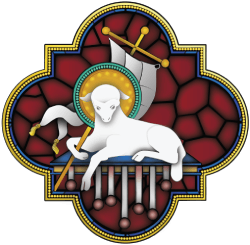August 25 | Pentecost 14, Year B
1 Kgs. 8:[1,6, 10-11], 22-30, 41-43 or Josh. 24:1-2a, 14-18
Ps. 84 or Ps. 34:15-22
Eph. 6:10-20
John 6:56-69
The Roman poet Virgil tells a contracted version of the founding of Rome in the opening lines of his great epic. “I sing of arms and the man, who first from the shores of Troy, buffeted about by fate, came to Italy and the Livinian shores, that one tossed among lands and sea by the powers of above, on account of the brooding anger of severe Juno, having suffered much in war, until he founded a city and carried his gods to Latium; whence rose the Latin race, the fathers of Alba and the high walls of Rome.” Fleeing the burning city of Troy, Aeneas carries his father on his back, takes the hand of his young son and, during his escape and the turmoil of war, is separated from his wife, whom he never sees again. With the gods of his ancestors in hand, Aeneas heads out to the shore and upon the open water.
You might say that we are summoned to leave the burning cities of this world — the evil powers of this world that corrupt and destroy the creatures of God — and to set out for the City of God, and we do so in a ship, which is the Church. We must, in a sense, go and go in haste, but unlike Aeneas, we are strictly forbidden to take our household gods. Our patriarch, Abraham, left everything and all other gods in pursuit of the one true God. “Now the Lord said to Abram, ‘Go from your country and your kindred and your father’s house to a land that I will show you. I will make you a great nation, and I will bless you and make your name great, so that you will be a blessing. I will bless those who bless you, and the one who curses you I will curse; and in you all the families of the earth shall be blessed’” (Gen. 12:1-3). Abraham, by his obedience, learned this essential lesson. “I am the Lord your God … You shall have no other gods before me” (Ex. 20:2-3).
In practice, this uncompromising monotheism competed again and again with alien gods. The people thought of and, in a sense, hid in their hearts not only the gods of Mesopotamia but also the gods of the lands through which they traveled, even the gods they heard of once they entered the Promised Land. So, again and again, their commitment to the one true God required renewal and dedication.
Listen to Joshua addressing the people and note their reply. “Now therefore revere the Lord, and serve him in sincerity and in faithfulness; put away the gods that your ancestors served beyond the River and in Egypt, and serve the Lord. Now if you are unwilling to serve the Lord, choose this day whom you will serve, whether the gods your ancestors served in the region beyond the River or the gods of the Amorites in whose land you are living; but as for me and my household, we will serve the Lord.’ Then the people answered, ‘Far be it from us that we should forsake the Lord to serve other gods; for it is the Lord our God who brought us and our ancestors up from the land of Egypt, out of the house of slavery, and who did those great signs in our sight. Therefore we also will serve the Lord, for he is our God’” (Josh. 24:14-17a, 18b). For a Christian, the place we journey to is the City of God, and the one God is revealed in the Lord Jesus Christ, to whom we owe all love and devotion. In the words of Simon Peter, “Lord, to whom can we go? You have the words of eternal life” (John 6:68).
Look It Up: Ephesians 6:18
Think About It: Keep alert and persevere. Look to Christ and move toward him who is your life.



